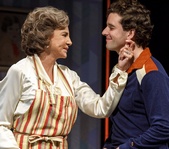
Clive Owen and Jin Ha
Phoro Credit: Matthew Murphy
Playwright David Henry Hwang made an auspicious Broadway
debut in 1988 with M. Butterfly. The
play and its original two stars - John Lithgow and B.D. Wong - received deserved awards and accolades. Almost
thirty years later, the play remains overflowing with ideas and enigmas. The
plot cannot help but grip an audience
with its strange and thoroughly engrossing fictionalized account of a true
newspaper story about a French diplomat, convicted of passing top secrets to a
spy over a period of 20 years. The diplomat had maintained that he never knew
that the spy, also his lover - a Chinese actor and Beijing Opera diva - was a
man. This provoking revival has been directed by Julie Taymor (Lion King) with tweaks and updates by
the author.
Told in flashback from his cell in a French jail, the story
of Rene Gallimard’s (Clive Owen) surrender to a bizarre affair, that seemingly
defies Western sensibilities, logic and rationale, is evocatively paralleled with
the male-female relationship in Puccini’s Madama
Butterfly. Evidently infatuated from
the moment he sees the intriguing Song Liling (Jin Ha) perform the title role at
the opera, the timid Gallimard is quickly swept away by the adoration and attention
lavished upon him by the femme fatale with kimono.
In his riveting play, Hwang deftly exposes and explores the bridge
that exists between Western and Eastern thought on every subject from race to
class to sex to politics. But his play doesn’t dwell on the familiar clichés usually
associated with East meets West. In fact, the more the relationship between
Rene and Song appears harder to accept in light of their prolonged affair, the
more Hwang appears to be probing complex feelings about Eastern and Western
cultures specifically the chasm between assertive and submissive sex.
Focused more on Gallimard’s more private feelings (“Will
anyone beautiful ever want me?”), the first half of the play is a little less compelling
than the stunning denouement which exposes Song’s own unashamedly revelatory account of the affair.
As an empathetic observer, it is shattering to see the tragically deceived Gallimard
descend into abyss of total fantasy and even madness.
Owen’s Gallimard is emphatically second rate yet we see him
as the eager manipulator who envisions himself, for the first time in his life, as confident
lover rather than as the duped dummy he really is. For all his converging
feelings and emotional ambiguities, Owen gives a restrained but totally convincing
performance. It is certainly as assured and compelling as the one he gave a few
season back in Harold Pinter’s Old Times,
his Broadway debut.
Certainly more extravagant in its concept, the role of Song
is both cynically and excitingly portrayed by Ha, who is making his Broadway
debut. I can’t imagine how the cataclysmic collision of Song’s feminine and
masculine natures could be more thrillingly revealed than it is by Ha. Taymor’s
crisp direction sweeps the action along, in and around designer Paul Steinberg’s
often spectacularly painted panels that frame the play. Humor and drama weave
through vivid scenes of traditional and post revolutionary Chinese operas as
the cast moves from semi-detached narrative back into character and from
fantasy to reality.
The often stunning costumes is the work of designer Constance
Hoffman) Designer Donald Holder’s superb lighting enhanced both the intimate
and the more extravagantly staged scenes. Choreographer Ma Cong gives the small
corps of dancers a chance to shine in both the traditional Chinese Opera scenes
with its martial arts and another that exploits the fervor of armed Cultural Revolutionaries.
Murray Bartlett is excellent as Gallimard’s boorish friend
as is Michael Countryman as Gallimard’s snide superior and in other roles. Enid
Graham is appropriately frosty as Gallimard’s wife Agnes. Celeste Den, making her
Broadway debut, is standout as a stereotypical member of the Cultural
Revolution. These minor characters make significant impact in a powerful and
mysterious play that is as fascinating to contemplate as it is entertaining to
watch.
"M. Butterfly" at the Cort Theatre 138 W. 48th Street
"M. Butterfly" at the Cort Theatre 138 W. 48th Street
